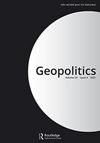The Geopolitics of Return Migration in the International System
IF 3
1区 社会学
Q1 GEOGRAPHY
引用次数: 1
Abstract
In an era marked by the twin rise of populist and pandemic politics, the world has witnessed a dizzying array of policy initiatives aiming at ensuring the quick return of refugees, rejected asylum seekers and irregular migrants. This Special Issue was conceptualised at a time when countries such as the United Kingdom (UK), the United States (US) and Denmark, previously portrayed as traditional countries of resettlement, have placed the returns (expels or deportation) of asylum seekers at the forefront of their politics of migration. Key regional migrant-receiving and refugee-hosting countries from Colombia, Kenya, Malaysia to Pakistan have lobbied for accelerated returns and deportations, decrying the strains that refugees and migrants pose on their infrastructures. In situations of protracted displacement, despite the United Nations Refugee Agency’s (UNHCR) warning against perilous returns, firsthost states, including Lebanon, Turkey and Bangladesh, have implemented rash return initiatives, aligning their politics of return with their geostrategic interests in regional conflicts on the one hand, and decrying insufficient global solidarity on the other (Fakhoury and Stel 2022; Mencütek 2022). In this special issue, we unpack the geopolitics of returns in the international system, drawing attention to the diversity of actors, practices, and policies that shape return governance regimes. In line with the scholarly debate, we understand geopolitics as a multi-faceted concept (Ferretti 2021; Kelly 2019). In its classical sense, geopolitics refers to the array of actions and policies through which states and regions seek to yield influence by leveraging their location, resources and statecraft power. At the same time, as critical streams of thought have shown (Ferretti 2021; Hyndman 2012; Sharp 2011) geopolitics encompasses the very processes through which ordinary people including refugees and migrants recast power politics and geostrategic environments. They do so either by resisting state-centric practices, engaging with国际体系中回流移民的地缘政治
在民粹主义和流行病政治同时兴起的时代,世界上出现了一系列令人眼花缭乱的政策举措,旨在确保难民、被拒绝的寻求庇护者和非正规移民迅速返回。本期特刊是在英国(UK)、美国(US)和丹麦等以往被描绘为传统的重新安置国家的国家将寻求庇护者的返回(驱逐或驱逐出境)置于其移民政治的最前沿的时候提出的。从哥伦比亚、肯尼亚、马来西亚到巴基斯坦,该地区主要的移民接收国和难民收容国一直在游说,要求加快遣返和驱逐,并谴责难民和移民给本国基础设施造成的压力。在长期流离失所的情况下,尽管联合国难民署(UNHCR)警告不要冒险返回,但包括黎巴嫩、土耳其和孟加拉国在内的第一接收国却实施了草率的返回倡议,一方面将其返回政治与地区冲突中的地缘战略利益结合起来,另一方面谴责全球团结不足(Fakhoury和Stel 2022;Mencutek 2022)。在本期特刊中,我们剖析了国际体系中回报的地缘政治,提请人们注意影响回报治理机制的行动者、实践和政策的多样性。根据学术辩论,我们将地缘政治理解为一个多方面的概念(Ferretti 2021;凯利2019年)。从传统意义上讲,地缘政治是指国家和地区利用其地理位置、资源和治国能力寻求产生影响力的一系列行动和政策。与此同时,正如批判性思维流所显示的那样(Ferretti 2021;Hyndman 2012;Sharp 2011)地缘政治包含了包括难民和移民在内的普通人重塑权力政治和地缘战略环境的过程。他们要么抵制以国家为中心的做法,要么与
本文章由计算机程序翻译,如有差异,请以英文原文为准。
求助全文
约1分钟内获得全文
求助全文
来源期刊

Geopolitics
Multiple-
CiteScore
7.60
自引率
10.30%
发文量
50
期刊介绍:
The study of geopolitics has undergone a major renaissance during the past decade. Addressing a gap in the published periodical literature, this journal seeks to explore the theoretical implications of contemporary geopolitics and geopolitical change with particular reference to territorial problems and issues of state sovereignty . Multidisciplinary in its scope, Geopolitics includes all aspects of the social sciences with particular emphasis on political geography, international relations, the territorial aspects of political science and international law. The journal seeks to maintain a healthy balance between systemic and regional analysis.
 求助内容:
求助内容: 应助结果提醒方式:
应助结果提醒方式:


